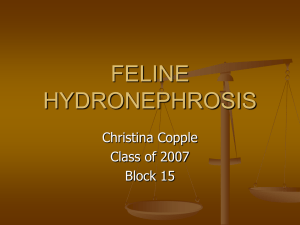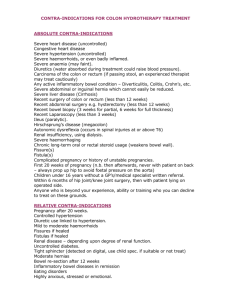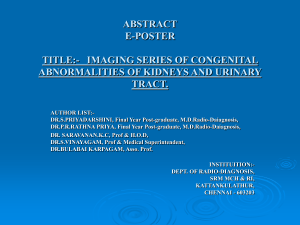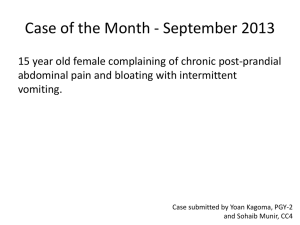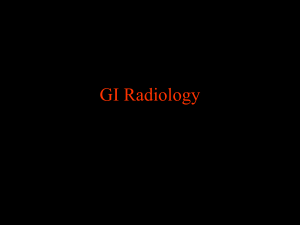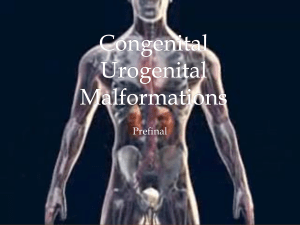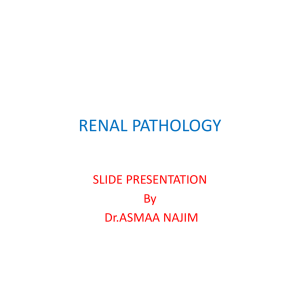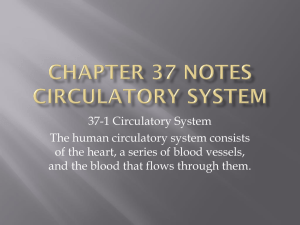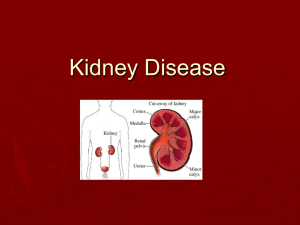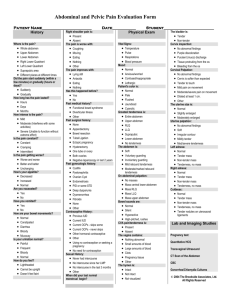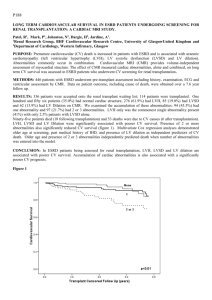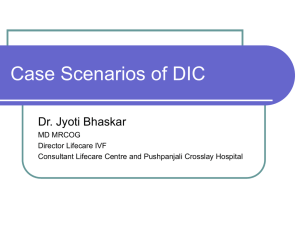Fetal_abnormalities
advertisement
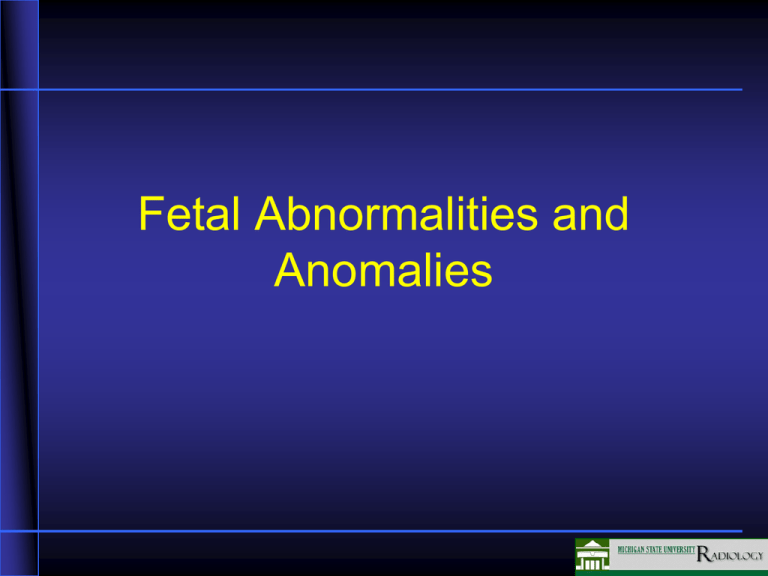
Fetal Abnormalities and Anomalies Fetal Abnormalities Detectable by Ultrasound • Brain – – – – Anencephaly Hydrocephalus Chiari deformities Encephalocele • Spine – Spina bifida cystica – Myelomeningocele • Renal – Hydronephrosis – Renal agenesis • Cardiac – Chambers – Orientation • General – Abdominal wall defects – Lung abnormalities Hydrocephalus • Dilated ventricles • Large sausage like hypoechoic area represents dilated lateral ventricle Intestinal Tract Abnormalities Detectable by Ultrasound • Omphalocele • Abdominal wall defects and gastroschisis • Midgut malrotation • Focal intestinal atresia Normal Development of Intestinal Tract • At 9 weeks there is physiologic herniation of the small bowel into the umbilical cord • The small bowel rotates 90 degrees counterclockwise around the superior mesenteric artery • At 12 weeks the small bowel returns into the abdominal cavity while rotating an additional 180 degrees counterclockwise around the superior mesenteric artery • Total rotation of 270 degrees Omphalocele • Midline defect • Covering membrane • Contains organs or bowel • Cord from apex of mass Omphalocele • Axial view midabdomen • Soft tissue mass extending to right • Abdominal contents outside the fetal abdomen • Note: enclosed by a membrane (arrows) Fetal Abdomen Gastroschisis • Defect of anterior wall • Lateral to umbilicus • Bowel loops float in amniotic fluid • Cord separate Gastroschisis • Lobulated echogenic mass • Free floating loops of bowel in the amniotic fluid Abdominal Contents Fetal Abdomen Umbilical Cord Normal UGI, Small Bowel • Small bowel distributed throughout the abdomen primarily to the left Mid-gut Malrotation • Barium UGI • Stomach normal position • Small bowel completely on right side of abdomen Normal Barium Enema • Normal colon frames the margins of the abdomen Mid-gut Malrotation • Barium enema • Colon located entirely on the left side of the abdomen • Same case as earlier malrotation case Duodenal Atresia • Plain film upright abdomen • “Double bubble” sign • Air distended stomach and proximal duodenum • Atresia involves second portion of the duodenum Image donated by Dr. Nancy Fitzgerald – Texas Children’s Hospital Houston Texas Skeletal Development Long Bones • Diaphysis ossified at birth (shaft of long bone) • Epiphysis radiolucent (cartilage) at birth except for distal femoral epiphysis – Develop Epiphyseal Ossification Centers (EOC) later in life Skeletal Development Long Bones • Physis – Cartilaginous plate between EOC and metaphysis – Responsible for growth in length – When ossifies (closes) – longitudinal growth stops – Weak point in the bone • Metaphysis – Active bone formation via formation and calcification of osteoid Bone Growth Abnormalities • Cartilage growth deficiency – Example: Achondroplasia • Ossification growth deficiency – Example: Osteogenic imperfecta • Metabolic defect – Example: Hypophosphatasia Osteogenesis Imperfecta • Deficient peri- and endosteal ossification • Multiple fractures • Healing with deformities of bones • Limb shortening Achondroplasia • Dwarfism • Deficient cartilage growth • Lower limbs with ruler to measure leg length • Short limb bones with flaring metaphyses Cardiovascular SystemDevelopmental Abnormalities • Congenital heart disease – Intra-cardiac septal defect (VSD, ASD) – Patent ductus arteriosus (PDA) – Tetralogy of Fallot (VSD, Pulmonary stenosis, Overiding Aorta, RV hypertrophy) – Endocardial cushion defect – Pulmonary stenosis (PS) • Congenital vessel anomaly – Coarctation of aorta – Transposition of the great vessels Normal Cardiac Anatomy • Right heart border – Upper portion - SVC and ascending aorta – Lower portion – right atrium • Left heart border – Upper portion – aortic arch – Mid portion – main pulmonary artery – Lower middle portion – left atrium – Lower portion – left ventricle Normal Chest Lateral • Anterior heart border – Upper portion – aortic arch – Mid portion – pulmonary artery – Lower portion – right ventricle • Posterior heart border – Upper portion – left atrium – Lower portion – left ventricle and IVC Atrial Septal Defect • Increased pulmonary vascularity • Small aortic arch • Large main pulmonary artery • Right atrial and ventricular hypertrophy Tetralogy of Fallot • “Boot-shaped” heart • Pulmonic stenosis (infundibulum) • VSD • Right ventricular hypertrophy • Overriding aorta • Pulmonary circulation decreased Renal Abnormalities • Anomalies in size and form – Horseshoe kidney • Anomalies in position – Malrotation – Ectopia • Anomalies in structure – Polycystic kidney • Anomalies of drainage system – Duplicated kidney, ureter Normal Kidney • Intravenous urogram • Opacification of collecting systems and ureters Duplication of Kidney • Both kidneys with 2 collecting systems • Right and Left upper system dilated • Lower units smaller • Ureters join before bladder Horseshoe Kidney • Horseshoe kidney • Joined at inferior aspect • Moderate hydronephrosis Horseshoe Kidneys • Axial images demonstrate kidneys joined across the midline anterior to the aorta and inferior vena cava Pelvic Kidney • AP tomogram • Both kidneys in the pelvis Polycystic Kidneys • Axial scan with contrast • Enlarged lobulated kidneys • Multiple cysts • Varying size CT Multiple Cysts Multiple Renal Cysts CT Renal Cysts Ultrasound Renal Cyst Renal Abnormalities • Hydronephrosis – Hypoechoic (Dark areas) • Thinning of renal cortex indicates long standing process Hydronephrosis Massive Hydronephrosis
